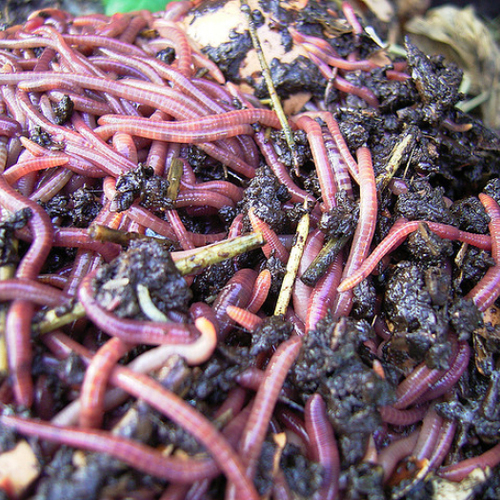Organic red worms: Ideal for soil health
Organic red worms: Ideal for soil health
Blog Article
Red Wigglers: The Secret to Eco-Friendly Composting
Red wigglers, scientifically recognized as Eisenia fetida, play a critical duty in sustainable composting practices, offering an all-natural option to lose monitoring. These worms not just take in natural products yet also change them into valuable vermicompost, enriching soil health and promoting environmental balance. As urban areas face raising waste obstacles, recognizing the benefits and appropriate treatment of these microorganisms ends up being essential for both gardeners and ecologists alike. What details steps can people require to harness their prospective efficiently?
What Are Red Wigglers?
Although lots of people know with earthworms, red wigglers (Eisenia fetida) are a particular species that play a crucial role in composting. Belonging to Europe, they have actually adjusted well to a range of atmospheres, especially in decomposing raw material. Unlike usual yard worms, red wigglers prosper in rich, damp settings, making them optimal for composting systems.
(eisenia fetida worms for sale)These worms are characterized by their reddish-brown pigmentation and extended bodies, normally determining between 3 to 4 inches in length. Red wigglers are epigeic worms, meaning they live near the soil surface area and feed upon decaying organic product. Their high reproductive rate permits populations to proliferate under optimum problems, with the capability to increase in number every couple of months.
Red wigglers have a special gastrointestinal system that enables them to damage down natural waste effectively. Their lasting nature makes red wigglers a beneficial possession in green composting techniques.
Advantages of Utilizing Red Wigglers
Using red wigglers in composting systems offers many advantages that boost both the performance of waste decay and the high quality of the resulting garden compost. These earthworms, clinically referred to as Eisenia fetida, are renowned for their phenomenal ability to eat organic waste, converting it right into nutrient-rich vermicompost at a remarkable rate. Their fast digestion procedure accelerates the malfunction of cooking area scraps and backyard waste, dramatically decreasing the moment required for composting.
Along with their performance, red wigglers add to enhanced dirt framework and fertility. The vermicast created by red wigglers is rich in necessary nutrients, helpful microorganisms, and humic acids, all of which enhance dirt health and promote plant growth. This nutrient-dense garden compost aids retain moisture and boosts oygenation in the dirt, promoting a prospering environment for plants.
Additionally, utilizing red wigglers for composting decreases garbage dump waste, adding to a more lasting waste management system. By drawing away natural materials from land fills, composting with red wigglers decreases greenhouse gas discharges, making it an environmentally friendly choice for environmentally conscious individuals and communities. In general, red wigglers give a reliable and sustainable remedy for composting.
Establishing Your Worm Container
Creating a worm bin is a simple process that requires cautious factor to consider of products and problems to ensure a flourishing environment for red wigglers. Begin by selecting an ideal container, which can be a plastic bin or wooden box, with a capability of at the very least 10 gallons for efficient composting. Make certain the container has appropriate air flow by piercing little openings in the lid and sides to allow air flow.
Next, prepare the bedding, which is crucial for preserving dampness and supplying a habitat for the worms. Ideal materials consist of shredded paper, cardboard, coconut coir, or peat moss. Purpose for a bed linens deepness of approximately 4-6 inches, guaranteeing it perspires however not excessively damp.
It is very important to maintain the appropriate temperature level for your worm container, ideally in between 55 ° F and 77 ° F(13 ° C and 25 ° C) Placement the container in a shaded area to protect against getting too hot. In addition, maintain the bin away from straight sunlight and severe weather to protect the worms.
Feeding Your Red Wigglers
Feeding your red wigglers is a crucial aspect of effective worm composting, as it straight affects their wellness and the efficiency of your composting system - red wigglers. Red wigglers flourish on a healthy diet plan being composed largely of natural waste products.
(red wigglers for composting)Begin with small quantities to enable the worms to eat the material totally prior to including a lot more. Display the food decomposition procedure and adjust the amount based on exactly how rapidly the worms are processing the waste.

Keeping Your Worm Garden Compost System
A well-maintained worm garden compost system is vital for making best use of the effectiveness and long life of your composting efforts. Normal monitoring of dampness degrees is vital, as red wigglers prosper in a wet setting, ideally around 70% moisture. If the bedding ends up being as well dry, lightly mist it with water; alternatively, if it ends up being excessively wet, add completely dry bed linen such as shredded paper or cardboard to absorb excess moisture.
Temperature level control is also essential. Ensure your compost system is kept in a shaded, ventilated location to avoid overheating.
Keep track of the worm populace and their task; a growing populace shows a well-balanced setting. By following these upkeep techniques, you can make sure an effective and sustainable worm composting system that effectively reuses organic waste.

Verdict
In verdict, red wigglers play a vital function in environment-friendly composting by successfully transforming organic waste into beneficial vermicompost. Welcoming the usage of red wigglers stands for a sensible technique to improving environmental sustainability and cultivating much healthier ecological communities.
Report this page